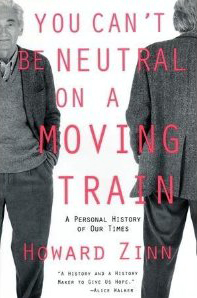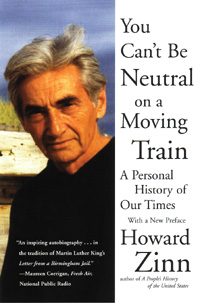Howard Zinn — activist, historian, and author of A People’s History of the United States — was a participant in and chronicler of some of the landmark struggles for racial and economic justice in U.S. history. In his memoir, You Can’t Be Neutral on a Moving Train, Zinn reflects on more than thirty years of fighting for social change, from his teenage years as a laborer in Brooklyn to teaching at Spelman College, where he emerged in the civil rights movement as a powerful voice for justice. A former bombardier in World War II, he later became an outspoken antiwar activist, spirited protestor, and champion of civil disobedience. Throughout his life, Zinn was unwavering in his belief that “small acts, when multiplied by millions of people, can transform the world.” With a foreword from activist and scholar Keeanga-Yamahtta Taylor, this revised edition will inspire a new generation of readers to believe that change is possible. [Publisher’s description.]
Previous Editions


Table of Contents
Foreword 2018 • p. vii
Preface 2002 • p. xv
Introduction: The Question Period in Kalamazoo • p. 1
PART ONE: The South and the Movement
-
- Going South: Spelman College • p. 15
- “Young Ladies Who Can Picket” • p. 26
- “A President Is Like a Gardener” • p. 37
- “My Name Is Freedom”: Albany, Georgia • p. 46
- Selma, Alabama • p. 56
- “I’ll Be Here”: Mississippi • p. 69
PART Two: War
-
- A Veteran against War • p. 87
- “Sometimes to Be Silent Is to Lie”: Vietnam • p. 103
- The Last Teach-In • p. 115
- “Our Apologies, Good Friends, for the Fracture of Good Order” • p. 126
PART THREE: Scenes and Changes
-
- In Jail: “The World Is Topsy-Turvy” • p. 141
- In Court: “The Heart of the Matter” • p. 151
- Growing Up Class-Conscious • p. 163
- A Yellow Rubber Chicken: Battles at Boston University • p. 183
- The Possibility of Hope • p. 197
Acknowledgments • p. 210
Index • p. 211
Excerpt
from the foreword by Keeanga-Yamahtta Taylor
This was not a scholastic endeavor for Zinn, even though he was a professor of history. But history was not academic exercise; it was a means to make sense of the world we live in and, if necessary, a guide to action. Zinn, a prolific writer and scholar, tore down the wall intended to separate activism — or partisanship — from the professed objectivity of scholarship. Instead Zinn told his students that he did not “pretend to an objectivity that was neither possible nor desirable. ‘You can’t be neutral on a moving train,’ I would tell them. . . . Events are already moving in certain deadly directions, and to be neutral means to accept that.”
Zinn eschewed neutrality, choosing to write reports, news stories, and multiple books from the perspective of the movements that he was active in. Prolific and without pretension, Zinn chronicled the civil rights and anti–Vietnam War movements for the general public. His writing exposed the broader world to the realities facing ordinary Black people across the South, while also challenging the assumptions that the United States, by the sheer volume of its bombing campaign in Vietnam, could impose its will on that tiny country.
Zinn’s magnificent autobiography, You Can’t Be Neutral on a Moving Train, is his own telling of the events and experiences within those movements that shaped his people-centered rendering of his history. It is a thin volume, barely two hundred pages, belying Zinn’s extraordinary life from his days as a bombardier in the Air Force during World War II, to his arrest as a civil rights activist in the South, to his negotiating the return of prisoners of war during the Vietnam War. The power of Howard Zinn the writer has overshadowed his fascinating history as an active participant in these powerful social movements. As Zinn said in an interview, “[I] had begun to wander out of the classroom to go see some history.”
This is a book written with a purpose that goes beyond touting the lifetime achievements of a well-known and influential person. What makes this an essential read is that Zinn is writing in response to the timeless questions that burn within anyone who cares about creating a more just society and world. Is change possible? Where will it come from? Can we actually make a difference? How do you remain hopeful? Zinn returns to these questions graciously and with humility by exploring his own journey toward radicalism. There are times when leftists disparage liberals for their continued faith in the system, becoming exasperated when they have not yet come to radical conclusions. Zinn makes the simple yet critical point that people make their own way to political consciousness: “You read a book, you meet a person, you have a single experience, and your life is changed in some way. No act, therefore, however small, should be dismissed or ignored.” For Zinn, this fluidity of political consciousness — people who may be completely passive in one moment but can be moved to act in a different moment — was the key to the emergence of a mass movement. To write off the possibility of change was to essentially write off the possibility of building the kind of movement necessary to change what was wrong in the world.
Category:




